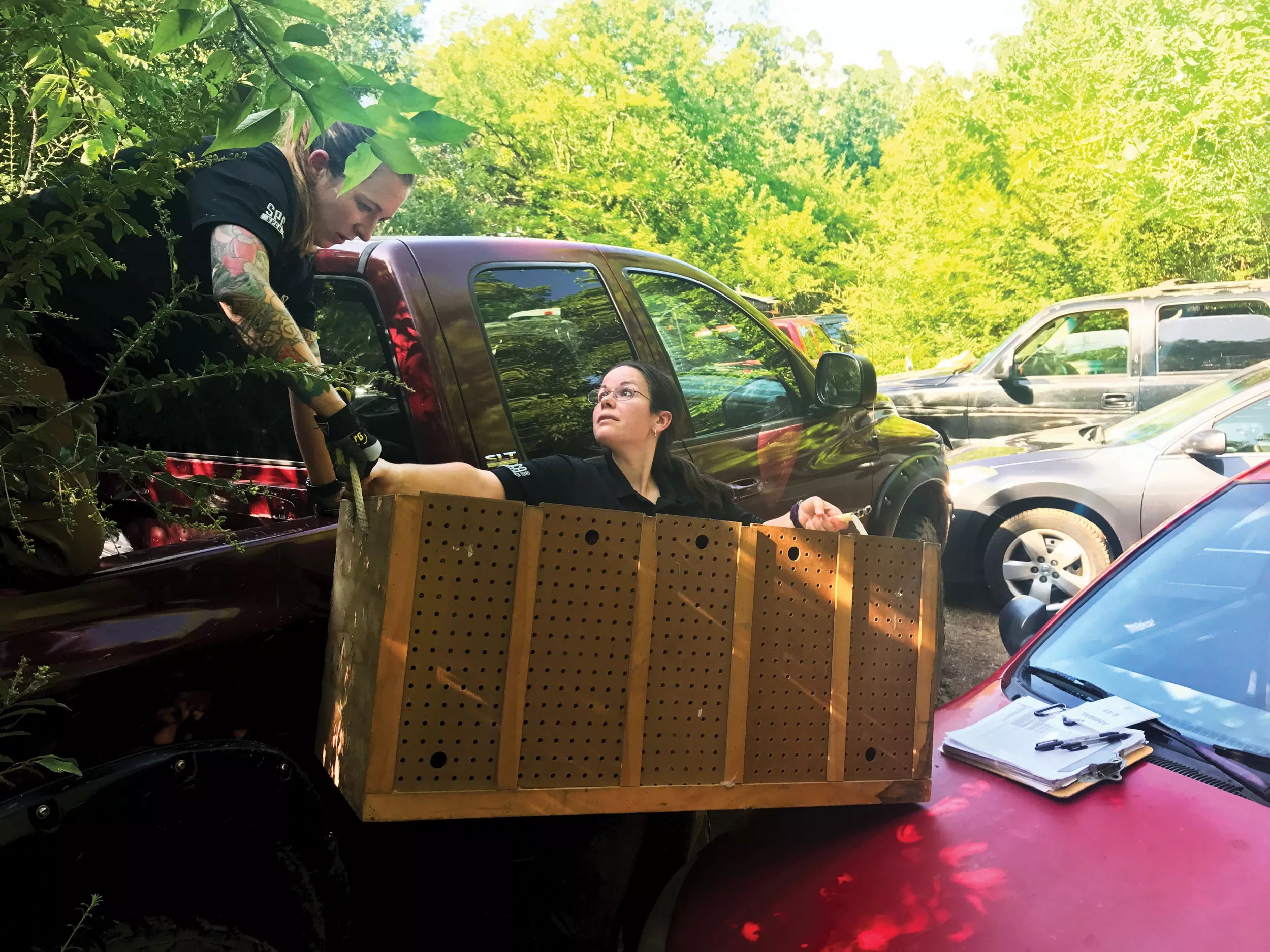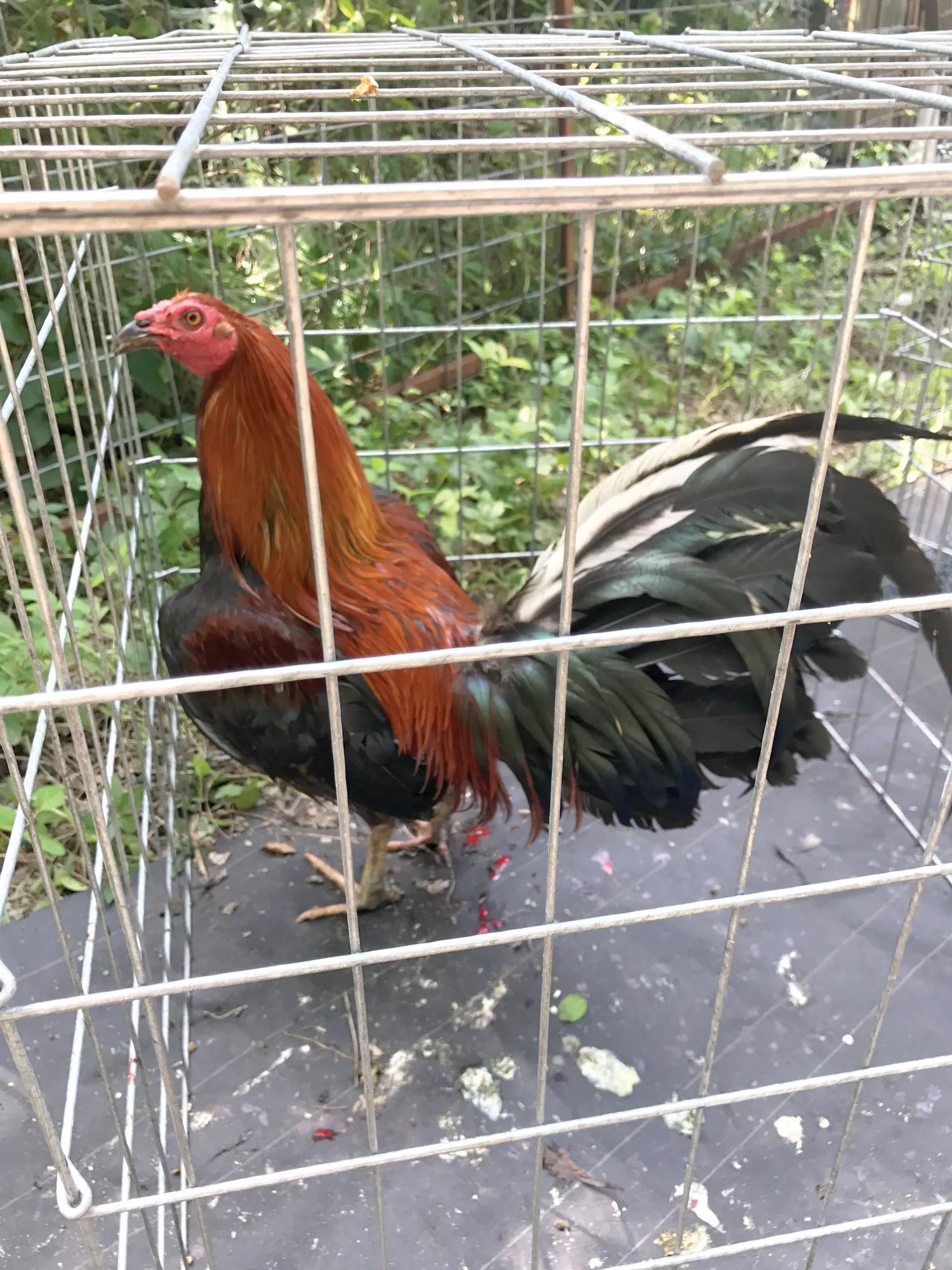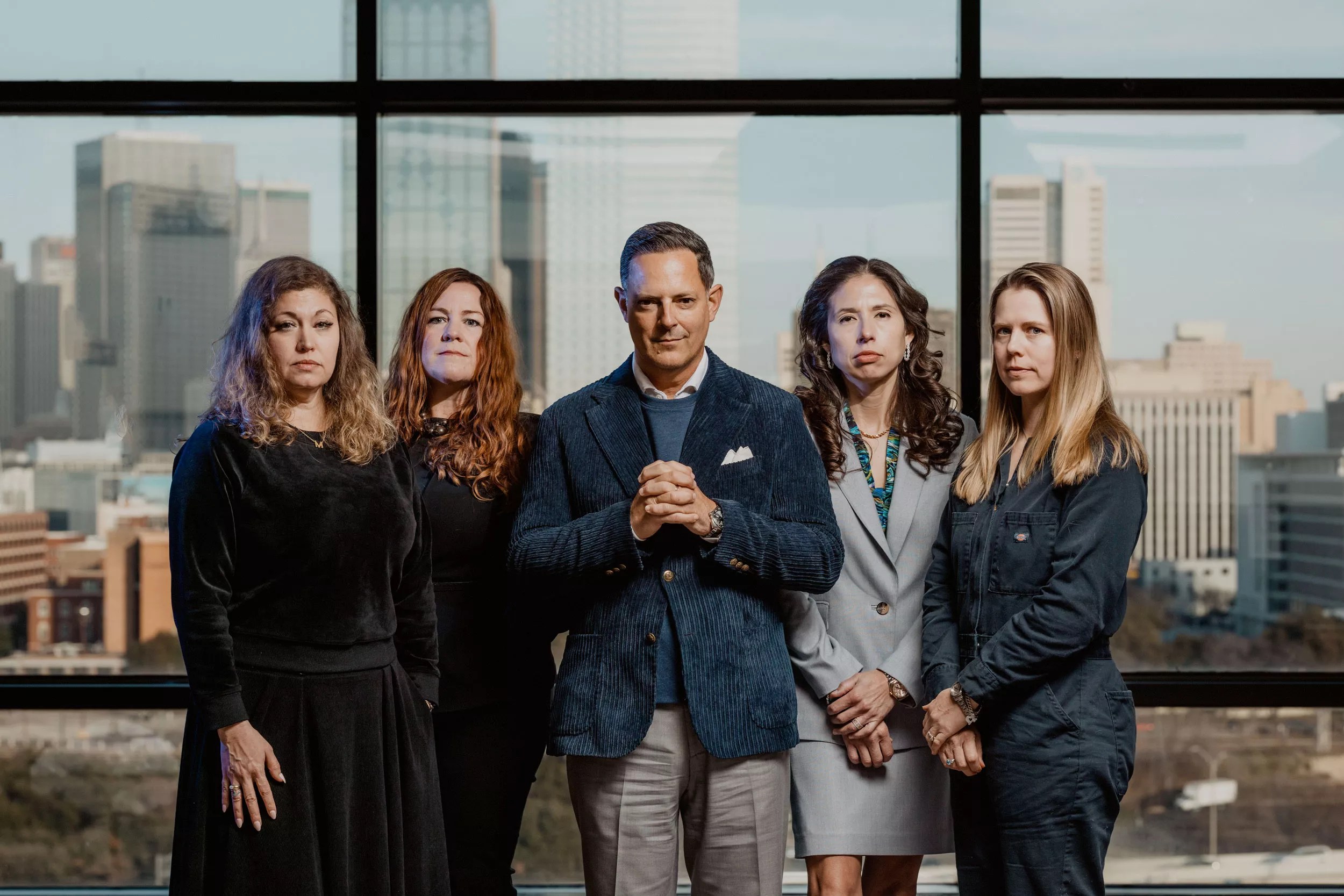
SPCA of Texas

Audio By Carbonatix
A blood-soaked rainbow of feathers decorates the ground, the last breaths of a dying rooster escape in weak squawks, onlookers cheer and a victorious bettor happily accepts his payout. The losing bird, with gouged eyes, broken bones and punctured lungs, is shoveled to his final resting place – the closest trash can. This isn’t a one-time event – it’s a common occurrence in North Texas.
Cockfighting is the illegal practice of forcing gamefowl roosters to fight one another, often to the death. Small knives, called gaffs, are tied to the bird’s spurs, and the flightless fowl are penned in a ring until one of the birds cannot continue. Gamefowl were intentionally bred for the blood sport and are a naturally aggressive breed, but fighting birds are given steroids and supplements to maximize damage.
“I have seen so many roosters bleeding out, left to die,” said Maura Davies, a spokesperson for the Society for the Prevention of Cruelty to Animals (SPCA) of Texas. “It just breaks my heart. It’s so hard to see, suffering. Watching animals suffer at that level is always hard, no matter when or where it happens.”
Recent arrests and animal seizures reveal a pervasive animal-cruelty issue in North Texas. But as local and national legislators plan to patch cracks in the system that allow cockfighting to persist, a growing voice in the South advocates for the opposite.
Fighting in Dallas
On Dec. 17, 2024, the SPCA of Texas busted a large cockfighting ring in Kaufman County. Two months earlier, a relative of the Kaufman County cocker – the person who breeds and trains fighting birds – was arrested for the same offense farther east in Van Zandt County.
In April 2023, the Dallas Police Department responded to a shooting in the southeast area of the city. In their search of the property they found gaffs and 2,000 chickens, many of which they believe were trained to fight. According to reports, the shooting was a result of a fight between the owner of the rooster mill and a disgruntled buyer disappointed in a recently purchased rooster’s performance in cockfights. The victim survived, and the shooter was arrested and charged with assault. He was never charged for cockfighting.
The December rescue mission saved the lives of 50 roosters, 43 hens, 34 dogs and 10 puppies when the animals were taken into custody by the SPCA of Texas. It was the first time Courtney Burns, the organization’s chief investigator, had seen cockfighting and dogfighting coexisting. Blood-stained treadmills, weighted collars and inhumane sheltering conditions on the property pointed to animal fights, and the SPCA opened an investigation.
This wasn’t the first time investigators took the 40-minute drive to Kaufman County to bust a cockfighting ring. In 2018, the SPCA of Texas rescued 90 birds and three dogs from a separate facility in the same county. After scouring the property, investigators found roosters crammed in wire cages with metal covers in a makeshift barn. The metal covers block out any natural light, keeping the roosters in complete isolation and enhancing their irritability. Their water source was tainted, and the drugs used to promote aggression weren’t far away. Investigators found gaffs, blood on treadmills and used breaksticks – the instrument used to pry dogs’ jaws apart during fights.
Following tips of cockfighting, investigators spent months looking into Barry Cook before the raid, then charged him with one count of cockfighting and one count of possessing gaffs. Cook pleaded guilty to cockfighting and was sentenced to one year in jail and 40 hours of community service.
The recent arrests don’t necessarily mean there has been an uptick in cockfighting, and not all fights take place in rural communities, Davies says.
“Unfortunately, what I have seen is an ongoing pattern of cases like this,” Davies said. “Over time, sometimes it can seem like there are more. But the sad reality is that animal fighting is and has been ongoing and further, it’s not just one particular area or another.”
Cockfighting happens everywhere, Burns says.
“It happens in backyards, on streets, every day.”

A rooster rescued in Dallas County in 2017.
SPCA of Texas
Cockers Blend With Avian Enthusiasts
In Texas, owning, keeping or training a rooster for cockfighting is a state felony punishable by up to two years in jail. Owning a rooster because you like birds is perfectly legal. Despite being born and bred for violence, the American gamefowl is not illegal. Gamefowl farms are scattered across the country, and rare bloodlines, fit for competitive showing, can sell for thousands of dollars.
Animal rights activists aren’t gunning for farmers interested in breeding beautiful birds.
“You can breed them all day,” Burns said. “The issue is when you make them fight to the death.”
It can seem incongruous for a government to allow breeding and selling gamefowl while explicitly outlawing cockfighting, yet that’s how it will likely remain. Many breeders, including reputable ones, contend that their goal is to preserve specific breeds of chickens with unique genetic traits, not to facilitate cockfighting. And if some of the claims that the roosters are being bred for looks and heritage sound disingenuous, that’s because they are. Still, it’s fighting that’s illegal, not simply raising up a cranky chicken.
Legal loopholes allow Texans accused of cockfighting to claim they are avian enthusiasts following tradition. Cockers, who selectively breed the most aggressive birds and keep them in squalid conditions, are often easily able to avoid charges. At cockfighting farms, gamefowl are tied to a structure for their entire life until it’s showtime. At legal gamefowl breeding farms, the birds are kept in similar conditions. Distinguishing the two can be challenging. Illegal gaffs easily become legal “antique collectibles,” and performance-enhancing drugs are “multivitamins”.
Unless there are dead birds with big gaping wounds and razor blades tied to their feet when police arrive on scene, making a case that a breeder was “knowingly” engaged in illegal activity can be tough.
The Legality of Cockfighting
In 1976, federal law made dogfighting illegal nationwide, and penalties have progressively increased for any participation. But laws around cockfighting haven’t kept up. The last state to outlaw the practice was Louisiana in 2008. Texas has had legislation that addresses the bloodsport since 1907, but enforcement remained low for years, and the current law leaves much to be desired. Attending a cockfight is only a Class C misdemeanor punishable by a $500 fine.
“We need to strengthen the cockfighting law more and make sure that these penalties really kind of stick to what cockfighting creates, which is a culture of lawlessness and obviously occurs with other felonious activity,” said Shelby Bobosky, a representative of the Texas Humane Legislative Network (THLN).
Most arrests related to cockfighting are the result of other investigations into separate crimes. Cockfighting hardly exists alone. Illegal alcohol sales, drug distribution, illegal gambling and firearm violations are some of the most common charges accompanying cockfighting busts. Unless investigators witness active cockfighting, which is rare, their case typically relies on paraphernalia charges.
“Having strong laws that can hold people accountable for abusing animals by making them fight, by being involved in any manner in animal fighting, holding people accountable is a big part of [preventing] it,” said Davies.

Rep. Rafael Anch
Nathan Hunsinger
President George W. Bush signed the Animal Fighting Prohibition Enforcement Act in 2007, which made it a felony to transport dogs across state lines for the purpose of fighting. There is no law, however, that prevents the transport of roosters, and finding roosters for purchase on Facebook takes minutes.
Iron Beak Farm, a breeder in Kaufman County, posted on its Facebook page a photo of its new import clearance form to ship gamefowl to the Philippines. Cockfighting has been called the “national sport” of the Philippines, and the country has incredibly loose laws that allow for legal cockfighting. Iron Beak Farm says online its birds are not for illegal use, but did not respond to inquiries.
The THLN firmly advocates for the Fight Inhumane Gambling and High-Risk Animal Trafficking Act, a congressional effort at the national level that would reduce disparities in animal-fighting laws, particularly regarding the shipment of roosters.
“That is something that needs to be done at a federal level, obviously, through interstate commerce,” Bobosky said. “That is still allowed. And so that is something that Texas itself can’t fix.”
The Surprising Argument in Favor
“I’m a fourth-generation gamefowl farmer, and when I grew up everything was legal,” said the president of the Oklahoma Gamefowl Commission, Anthony Devore. “To be able to say, I’m gonna take your heritage away from you because I don’t like you or I don’t like what you stand for, that’s my heritage and I’m not breaking the law.”
The Oklahoma Gamefowl Commission (OGC) is a state version of the larger United States Gamefowl Commission, a nonprofit group that openly advocates for gamefowl breeders and lobbies to decriminalize cockfighting.
Heritage is a common cry of advocates for cockfighting. While there are bloodlines that trace back generations, and ethical breeders across the country who only show the birds, decriminalizing cockfighting is a far stretch from honoring tradition and avian enthusiasm.
DeVore maintains that his organization is not dedicated to defending cockfighting but instead prioritizes farmers’ rights.
“We don’t endorse any illegal activity,” said DeVore. “We don’t endorse that. We, at this point, are fighting for ownership rights.”
Before “this point,” the OGC endorsed local politicians who drafted bills to reduce the criminal penalties for cockfighting. In 2023, Oklahoma Rep. JJ Humphrey filed a bill that would reduce the state penalty for cockfighting to a misdemeanor. The bill failed twice, as did a similar Senate bill filed by Oklahoma Sen. Lonnie Paxton. But the organization continues to campaign for amendments to the state’s laws and has gained the support of several conservative politicians who agree the penalties are too severe.
Owning, keeping or training gamefowl for cockfighting is punishable by up to 10 years in jail per bird in Oklahoma. DeVore says sentences for cockfighting offenses that are more severe than drug charges are “not right.”
State gamefowl commissions exist in Arkansas, Louisiana, Georgia, Kentucky and other Southern states. There is not an active group in Texas, though there is a national board member who represents the interests of the Lone Star State.
“I don’t think we have any political plans to launch a political entity in Texas at this time,” DeVore said. “We were discussing it. We are a conservative, rural, farming type of political association. We feel like Texas would be like going to California or New York. We just think it’s too liberal to have an impact legislatively.”
Perhaps only an Oklahoman advocating for reduced cockfighting penalties would compare Texas to so-called liberal havens such as California and New York. Texas has more farms and ranches than any other state; the Republican Party controls the state Senate and House of Representatives, and the governor and both U.S. senators are Republicans.
DeVore is firmly against proposed legislation that would limit the transportation of gamefowl, claiming that the gamefowl industry was once a $400-million industry in his home state.
“The animal rights activists, they want to say, ‘You can’t sell them over there because they fight them over there.’ You’re gonna tell me I can’t sell to a foreign country? That’s funny. You’re creating financial hardships on the farmers here.”
He uses a myriad of hot-button terms, like “criminal justice reform” and “human rights issue” to make his argument. DeVore creates lofty connections to property and ownership rights, claiming that such liberties are threatened by activists working to strengthen cockfighting laws. He also compared the assumed threat to Adolf Hitler’s fascist Nazi regime.
“I don’t think we’re the enemy. If you look at the history of politics and what goes on in the world in 1937, there’s this guy named Adolf Hitler. The first thing he did was take away animal ownership rights. That’s one of the very first things he ever did in Germany.”
(“The Nazis passed the world’s most progressive animal-rights legislation,” Hal Herzog, a Western Carolina University psychology professor who studies human attitudes toward animals, told The Atlantic in a story published last November. The regime enacted restrictions on hunting and banned the killing of pets for population control. It also banned Jews from owning pets. So DeVore is not wrong on his facts, though the suggestion that outlawing animal cruelty is a slippery slope to Nazism seems more dubious than calling Texas a hotbed of liberalism.)
To be clear, at this time, there are no efforts to outlaw the ownership or breeding of gamefowl chickens in the United States.

The Dallas County team protecting animals, from left : Maura Davies, SPCA of Texas Vice President for Marketing and Communications; Shelby Bobosky, Texas Humane Network Executive Director; State Representative Rafael Anchia; Jessica Trevizo, Dallas County Community Prosecution & Animal Cruelty Chief; Dr. Virginia Charney, Operation Kindness Forensics Veterinarian.
Nathan Hunsinger
The Dallas Lawmaker Rewriting the Laws
Ready for a different kind of fight is Rep. Rafael Anchía, who will go into the upcoming legislative session swinging hard for animal rights. Anchía pre-filed House Bill 1795, which makes all animal fighting-related offenses felonies, further strengthening the existing dogfighting laws and finally penalizing cockfighting at the same level.
“This is a tough on crime bill,” Anchía said. “It’s targeted to also protect animals, which is an expression of our values as a community.”
Also in his corner is a Dallas County assistant district attorney, Jessica Trevizo, who is chief of the animal cruelty and community prosecution unit. She’s been working behind the scenes on the bill for the last two years. While Anchía is the self-described vessel bringing the issue to the Capitol, the city he represents is steadfast in its commitment to end cockfighting.
“We’re lucky enough in Dallas County to have the Dallas Police Department that has a dedicated unit that actually cares, that does the man work, the legwork,” Trevizo said. The Animal Cruelty Unit is a seven-person team dedicated to animal investigations.
For Anchía, the bill saves two birds with no stones – protecting animal welfare while preventing the associated crimes.
“It’s the unlawful organized crime activity that we’re really targeting,” he said.
Anchía anticipates successful legislative change. Despite the growing chatter in bordering states, he believes lawmakers will unite to protect people and animals in Texas.
“It’s absolutely not a partisan bill,” he said. “This is about how our state expresses our values with respect to the rule of law and also animal welfare.”
As for gamefowl breeders concerned about the future of their farms, Anchía recognizes the importance of the fowl for ethical farmers across the state.
“We want to make sure that this bill doesn’t necessarily catch lawful breeders,” he says. “It’s not the goal of this bill. We’ll work with the association to make sure that the activity that they engage in, which is lawful, is not covered.”
Battling underground cockfighting and the crimes that accompany it is a team effort. And Dallas has a team made up of politicians, lawyers and animal rights activists who are working to strengthen the laws and increase penalties.
“It’s a different animal, but obviously the same blood sport, the same felonies that are happening at these fights,” Bobosky said. The THLN has been instrumental in the drafting and passage of bills similar to the kind Anchía is filing. “We need to bring it up to the stature of the dog-fighting law.”